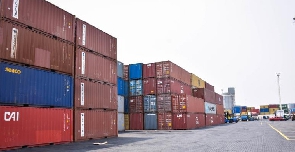 Import revenues made from the various ports by government have also declined
Import revenues made from the various ports by government have also declined
Cumulatively, the country’s imports volumes have seen a decline by almost 88 percent, during the period start of 2019 to date, compared with the corresponding period of last year, with the revenues from the imports also reducing by 82 percent.
Import revenues made from the various ports by government have also consequently witnessed a significant decline from the start of the year to July 2019, year to date.
This was revealed in an interview with the Deputy General Manager of the Ghana Community Network (GCNet), Emmanuel Darko, following the company’s presentation of a dividend payment to the Finance Minister, Ken Ofori Atta.
Mr. Darko further noted that the levels of imports, measured by weight, have also reduced by about 42 percent.
Darko explained that the revenue decline has mainly been as a result of the import duty concessions granted by government. Both the benchmark values used in assessing the value – and consequent import duties payable – on most imports and several port charges were reduced drastically by government effective from April this year.
“When policy-makers made the policy, the intention was that it was going to increase the volumes, which would compensate for an anticipated interim revenue fall,” he said.
This has not happened yet although both government officials and GC-Net executive remain confidence that it will happen soon, after the inevitable policy transmission lag has run its course.
Non-oil imports fell to US$4,915.0 million for the first six months of this year, down 7.1 percent from US$5,290.9 million last year. Similarly, oil imports fell by 12.6 percent to US$1,143.6 million, down from US$1,309.1 million last year.
Effective, April 4, 2019, there was a reduction in benchmark value of import duties at all of the country’s ports, where benchmark value of import duties was slashed by 50 per cent while those for vehicles were reduced by 30 percent.
However the reduction in imports may also have been an effect of the recent sharp cedi depreciation which have made locally made substitutes more price competitive. This is correctly seen by economists as a good thing as it increases Ghana’s potential to sustain the merchandise trade surplus which it has been enjoying since late 2016 after more than a decade of continuous trade deficits..
Government Revenue
Provisional data for the first five months of 2019 indicates that, total revenue and grants amounted to GHc 18.5 billion compared to a programmed target of GHc 21.5 billion, indicating an annual growth of 7.6 percent.
According to the Institute for Fiscal Studies, over the last two years, the weak-performing areas of tax revenue were the same areas that experienced most of the “nuisance” tax cuts enacted by the government in 2017. This suggests that the tax cuts have contributed to the government’s failure to realize its revenue expectations, as their adverse short-term impact on revenue mobilisation was underestimated. Government officials though point to the acceleration in the economic growth rate since 2017 as justifying the tax cuts.